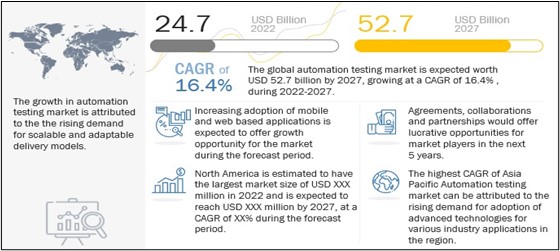Looking back to earlier days, software testing was limited to identifying and troubleshooting application bugs. Formerly, its main objective surrounded the delivery of high-performance applications. However, with the demand for complex software, you might turn your focus on factors that could enhance the testing approach.
Day-by-day increase in the complexity of Software Development Life Cycles demands quick release, less delivery time, and frequent feedback on the software. To achieve this, organisations seek to optimize and enhance testing metrics, automate manual tasks, and increase team productivity to gain exceptionally high user experience. This necessitates automation testing to be more innovative. Here, enter the use of Artificial Intelligence (AI) in automation testing.
You can understand automation testing as an approach where you execute the test without human effort. When you look at the report of MarketsAndMarkets, the automation testing market size projects to USD 24.7 million in 2022 and is expected to rise to 52.7 billion by 2027 with a CAGR of 16.4%. Hence, automation testing is the future of software development, which can go in pace with the rapid advancement of modern technology like AI.

With time, more improvisation is made in automation testing to have the entire application tested automatically. Using AI in automation testing can be one of the best approaches to achieve this. AI simulates human intelligence in machines and mimics human behavior. This led to the shift from manual software testing to continuous automated testing.
We will present the 7 benefits of using AI in automation testing in the present blog. It will help you learn the significance of using AI in facilitating automation testing. Additionally, in the future, you can also ensure your application is successfully delivered with zero bugs and full efficiency with AI and automation testing. We have structured the blog into seven sections, each highlighting the benefits of AI for your better understanding.
However, before that, let’s dive deeper into understanding automation testing and AI.
AI in Automation Testing
Being in software testing, your priority concern is a bug-free application and a seamless user experience. However, with the change in the dynamics of software testing, testers prefer AI for the delivery of software applications. In line with this, we are slowly moving towards a trend where AI will take control of the execution of test codes in the race to develop high-quality products.
In automation testing, the use of AI is the latest trend in ensuring the quality of software products. AI utilises its machine learning algorithms to train models with a large volume of data. Such trained models are used to automatically generate test cases, thereby making automation testing easy. It also allows for the protection of the application against failovers, which may cause difficulties in its use. Therefore, you can expect the advancement of automation testing with AI.
Why do we need AI in Automation Testing?
In the Software Testing Life Cycle, you might have encountered a situation where doing exhaustive testing by humans is impossible due to a lack of time and resources. However, with AI, the manual aspect of software development can be lowered while automating the entire process, thus highlighting its needs. However, this is only one of the reasons for the need to optimize automation testing with AI.
Some other reasons are explained below:
- Currently, we require a system that can intelligently identify elaborative and focused regions opted by automation based on recurrent
- AI can be an option to make an exceptional and innovative test environment. It could help in efficiently automating the processes.
- AI algorithms can be a good approach for the testing industry to develop smarter and more productive software for the end-users.
- AI algorithms work as the genuine user accessing automation. With respect to that, we can identify the domain in the software process which can be optimized with machine learning and deep learning algorithms.
- By integrating AI and automation testing, we could find a maximum number of bugs in less time. Thus, the application developed could be more reliable and accurate as the outcome.
Overall, with the increase in new demand for complex and high-quality software, you might think of an alternative that can save you time and ease your work. Organisations looking for a better testing approach with fewer resources, for which AI is the best option. Thus, a shift to AI automation is an amazing option for software development. Now we will explore some concrete benefits that AI offers in automation testing.
7 Benefits of using AI in Automation Testing

We have looked in detail at AI and its integration into automation testing. This would help you gain insight into the latest trends in automation. At the same time, it is important to consider the benefits of using AI in automation testing. It will not only allow you to know the basics of AI but also show you a path to integrate it into automation testing.
Following are the 7 benefits of using AI in automation testing:
- Improved and greater Test Coverage
- Increase Testing Efficiency
- Improve Defect Tracing
- Enhancement of Regression Testing
- Enhance and improve accuracy
- Allows easy maintenance of test
- Allows Continuous Testing
Have a look at its detailed explanation:
Improved and greater Test Coverage
Using AI with automation testing improves test coverage by analyzing large sets of data and recognizing patterns. AI exists with the ability to learn from historical data, file content, data tables, and internal program statistics. This makes it possible to mark the area that needs more testing. Hence, when you use AI in automation testing, you can easily identify complex scenarios that may be missed by manual testing, leading to increased test coverage.
AI’s capability to adapt to changes in software requirements has a crucial impact on improving test coverage. As a result, the software is thoroughly tested and delivered in high quality.
Increase Testing Efficiency
You should know that AI prioritizes test cases based on the possibility of failure and the complexity of the tested features. Therefore, you will be able to run high-priority tests at first, allowing the detection of bugs in the early stages of development. Further, it also automates the development of test cases, allowing the testing team to focus on other crucial tasks like test analysis and execution.
As an outcome, it will lead to early error fixation in software and reduced automated test script development time and automated test script execution time. Another significance of AI-formed test cases is ensuring coverage of all possible scenarios in software testing, thereby increasing its efficiency.
In a nutshell, using AI in automation testing could increase the test cases’ speed more than human testers, lowering testing and increasing software development efficiency.
Improve Defect Tracing
Adding or making changes to the software often leads to an increase in data, which indicates an increase in the number of bugs. AI in automation testing can track bugs, errors, or issues spontaneously. It quickly outlines the bugs and allows the team to have a seamless experience.
AI uses machine learning algorithms to analyse a huge volume of data that shows the main cause of defects. This led to improved defect tracking ability in automation testing; thereby enhancing defect tracing in the software development process. To this, the data sources, like application logs, performance metrics, and error messages, are evaluated to find the defects and their root causes.
Additionally, while automation testing, AI allows the prediction of potential defects based on the identified patterns from the data sources. This resulted in the automation of defect logging, resolution, and reporting methods. Thus, AI enables the formation of intelligent defect-tracking systems.
Enhancement of Regression Testing
Considering software’s rapid and progressive deployment, the need for fast and improved regression testing may be beyond the scope of humans. Using an automation approach in regression testing is always preferred, but sometimes this also turns out to be tedious. The reason is the writing of test scripts.
Using AI in automation testing, regression testing can be done easily. Organizations adopt AI to create test scripts and execute test cases. You can run regression testing with AI, which gives immediate feedback on changes to the software’s functionality.
In addition, AI enables the formation of intelligent test suites that easily adapt to changes in the tested software. It leads to prioritizing crucial bugs for their timely fixation in real-time. This significantly enhances regression testing.

Enhance and improve accuracy
With traditional testing methods, error and reliability are software testers’ major concerns. Some of the defects may be missed by general automation testing. However, with AI in automation testing, there is no chance for such an occurrence since it can easily identify critical test cases and develop cases based on its memory of data. Hence, you can use AI-powered testing tools to accomplish this with a low risk of false positives and false negatives.
With AI in automation testing, you can easily test the color, size, and shape of your preferred elements. This is also called “visual regression testing,” which in turn improves the test’s accuracy. Similarly, with functional testing, using AI, the test comprehends the work of elements; thereby lowering test authoring time.
Overall, using AI in automation testing allows us to check software thoroughly. This led to improved test accuracy and ensured the smooth release of the software product.
Allows easy maintenance of tests
One of the sizable issues often encountered by every tester is the maintenance of test scripts. Such an issue is exaggerated when large-scale products and complex development environments are involved. AI is the best approach to maintaining the test easily.
The AI-based automation testing tools, based on testing requirements, maintain and extract test scripts. It can effortlessly search for the code change made in the software and give intelligent feedback on things requiring more testing or refinement.
With the use of AI in automation testing, you can easily predict future test failures. It helps the testers focus on the issue and maintain the test proactively. Thus, all such activities of automation testing are improved with AI, and the time-consuming maintenance process is reduced.
Allows Continuous Testing
AI-driven automation testing can be easily integrated with Continuous Integration and Continuous Delivery (CI/CD). You can set tests to execute both intelligently and continuously. Setting the condition of the test is possible with AI, for example, by activating an action if a specific outcome occurs. It is possible to run multiple tests in parallel as often as needed. This ensures a bug-free and high-quality website.
Continuous testing cloud like LambdaTest allows you to perform cross-browser parallel testing at scale over an online browser farm of 3000+ browsers and operating systems while integrating with the CI/CD pipeline.
Continuous testing with AI can also be done through different means. For example, it optimizes test execution, gives real-time feedback, includes continuous learning, and identifies performance issues. This enables the team to deliver high-quality software applications efficiently and reliably.
Conclusion
We are heading toward an era where AI will be normalized and replace crucial software testing activities done manually. The use of a basic form of AI is already at its peak. We are required to continue the testing evolution to achieve its efficiency in the delivery of software applications. With the use of AI in automation testing, a new frame is added to software testing. It offers a great opportunity to ship faster and improve the quality of the software.
By scaling AI in automation testing, organizations can deploy software applications more quickly and be first in the market. With this, you can enter into unparalleled work value and safeguard the competitive advantage.





